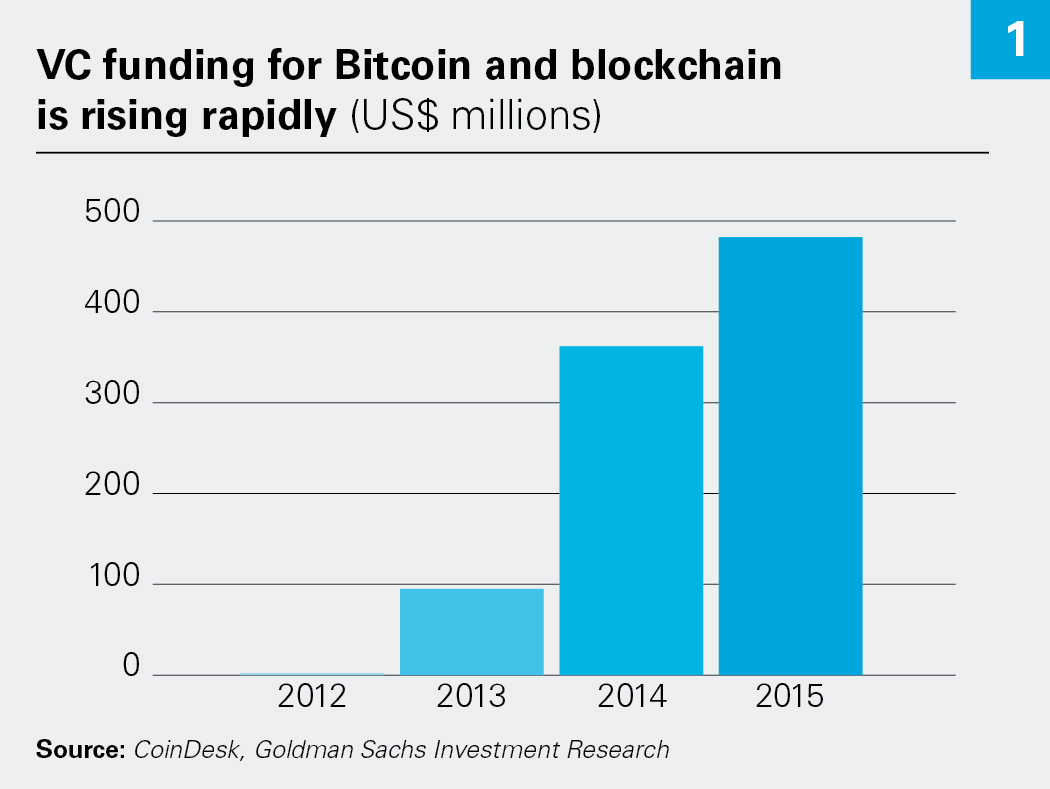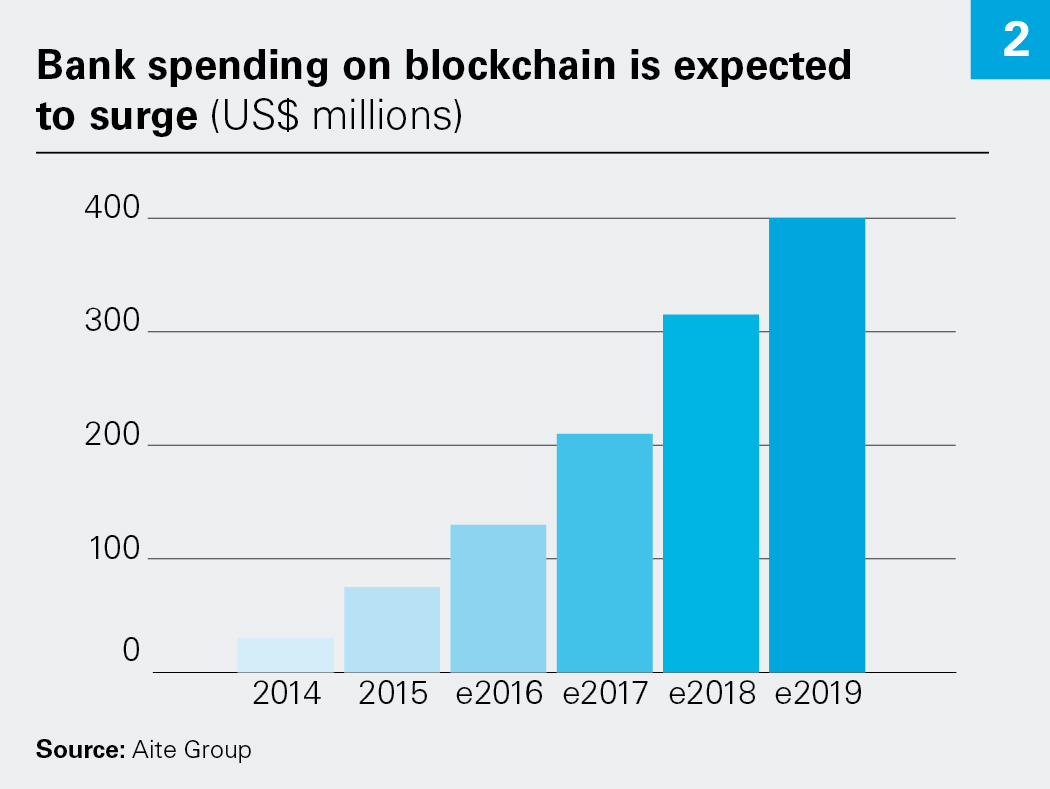Blockchain, the technology behind the cryptocurrency Bitcoin, is one of the hottest topics in the financial sector. Dozens of large financial institutions, including many of the world's major banks, have already launched initiatives to explore blockchain's potential.
As applied in the Bitcoin context, blockchain is a decentralized, public ledger that contains the details of every Bitcoin transaction that has ever been completed. Due to a number of innovative technical protocols, the ledger has proven to be exceptionally accurate and secure.
Interest in the technology exploded when it became clear that blockchain can be used to document the transfer of any digital asset, record the ownership of physical and intellectual property, and establish rights through smart contracts, among other applications. By reordering and automating complex, labor-intensive processes, the technology can enable organizations to operate both faster and more cheaply.
Blockchain could reduce banks’ infrastructure costs by US$15 – 20 billion per annum by 2022.
Financial institutions are exploring a variety of opportunities to use blockchain, including applications to improve and enhance currency exchange, supply chain management, trade execution and settlement, remittance, peer-to-peer transfers, micropayments, asset registration, correspondent banking and regulatory reporting (including applications related to "know your customer" and anti-money-laundering rules).
Highlighting the potential for banks, Santander issued a report in 2015 estimating that blockchain "could reduce banks' infrastructure costs attributable to cross-border payments, securities trading and regulatory compliance by between US$15 – 20 billion per annum by 2022." And there is reason to believe the actual figure may be higher.
For most large financial institutions that are exploring blockchain opportunities, 2016 will be a year of continued innovation and experimentation. But these activities are only a prelude to profound changes throughout the financial sector.
ABCs of Blockchain
Blockchain is a technology that was initially developed for Bitcoin, the cryptocurrency. It is a distributed ledger or database that is operated by a peer-to-peer network of unaffiliated participants. Using computers running sophisticated algorithms, these participants, so-called Bitcoin "miners," process transactions according to strict protocols that ensure a very high degree of accuracy and security. Anyone can participate—the blockchain is fully transparent and available to all—but only the miners that are the first to process an individual transaction are compensated.
As individual transactions are processed and verified by other miners on the network, they are bundled into groups called blocks; blocks of transactions are linked together to make the blockchain.
Every Bitcoin transaction is permanently recorded in the Bitcoin blockchain for all to see, creating an ever-growing historic record of activity. The mining process creates continuous, decentralized monitoring by every computer on the network and ensures the accuracy and security of the blockchain record.
Blockchain has the potential to transform how business and government work in a wide variety of contexts.
Blockchain technology revolutionizes the transaction process by dispersing control and providing total transparency, obviating the need for the type of middlemen or centralized authorities that traditionally conduct, authorize or verify transactions.
The use of blockchain is not limited to Bitcoin or other cryptocurrencies. Blockchain has the potential to transform how business and government work in a wide variety of contexts. Blockchain can be used to record and track the details of any transaction or ownership of any asset, including tangible assets such as real estate and intangible assets such as intellectual property. It can also be used to automate contracts, dramatically simplifying the process of creating and executing them. (Importantly, companies can choose to develop public or private blockchains, depending on their objectives; see the sidebar "Public vs. Private Blockchains" for more detail.)
The perception of blockchain's potential is reflected in investment trends. According to Goldman Sachs, venture capital (VC) firms invested almost a billion dollars in the technology over the last three years, with about half of that amount invested in 2015 (Chart 1). As we will see, financial institutions are among the biggest investors in blockchain, reflecting a growing belief that the technology may actually have its greatest impact in the financial services sector.
![]()
View full image
PUBLIC VS. PRIVATE BLOCKCHAINS
To understand the difference between public and private blockchains, consider the difference between the Internet, which is public and available to everyone, and intranets, which are created by specific entities and only available to certain individuals with permission.
Public blockchains are decentralized and accessible to anyone, regardless of their affiliation. Transactions are publicly verified and remain in the public domain. To ensure the integrity of the system and to validate transactions, financial-incentive and consensus mechanisms are built into the system. Crowdsourcing is an advantage of public blockchains, which are outside the control of any private or governmental entity. Because a public blockchain is available to anyone, improvements are made by consensus of the participants. Open access encourages greater participation and makes it more likely for public blockchain networks to be employed in a wider variety of applications. Importantly, public blockchains offer the potential for reducing transaction fees. In the Bitcoin network, for example, the average processing fee for a Bitcoin transaction is .04 cents, compared to more than .35 cents for a typical credit card transaction.
Private blockchains are set up and maintained by a private entity. Security protocols control and limit access to authorized parties. Transactions are verified within the private blockchain and can potentially be altered within that private network, which enables operators to correct errors. This feature is not permitted in public blockchains, in part because it can create security risks. There are two types of private blockchains: consortiums, which include preselected participants from a variety of organizations; and fully private blockchains, which are limited to participants from one organization. Private blockchains can authenticate transactions more quickly— generally within seconds—because they operate on networks that are more centralized and are made of up fewer computers. In contrast, it can take as long as two hours to authenticate a Bitcoin transaction, which happens on a globally distributed, public blockchain involving thousands of unaffiliated computers.
Blockchain Applications in Financial Services
An array of major financial institutions already has launched efforts to explore the potential opportunities blockchain holds for their businesses. Some, such as USAA Bank and BBVA, have invested millions of dollars in Bitcoin service providers such as Coinbase and Circle to study blockchain applications. Others, such as Barclays and Fidelity, have created accelerators or sponsored hackathons to provide space for and learn from startups. Others still, such as Citi and Nasdaq, are beta-testing systems built on top of the blockchain technology to explore its potential.
Goldman Sachs filed an application for a patent on a settlement system for securities markets that would employ its own cryptographic currency, the SETLcoin. Goldman is also one of 42 financial institutions (half of which rank among the 100 largest in the world, by revenue) that joined a blockchain consortium launched in 2015 by R3 CEV, a financial technology firm. This consortium, one of the first cooperative efforts among major institutions in the financial services sector, is exploring opportunities to deploy blockchain in new financial products and services, as well as in their ongoing operations.
Indeed, financial institutions invested US$75 million in blockchain technology in 2015, according to the Aite Group, a financial services research firm. That is more than double the amount invested in 2014, and Aite estimates that financial institutions will be investing five times that amount annually by 2019 (Chart 2).
The following are some of the areas and applications getting the most attention in blockchain from financial services companies and regulators.
![]()
View full image
Trade execution and settlement
Blockchain will enable faster settlement at lower costs while simultaneously lowering the risk of fraud. Some companies will develop unique and powerful trade and settlement offerings. One example is Nasdaq's private Linq blockchain network, which enables private companies that have not yet been subjected to the recordkeeping demands of public listing to keep track of changes in the ownership of shares issued to founders, early investors and employees. Similarly, Ripple has established a powerful value exchange platform over which financial institutions can exchange, in real-time, currency, cryptocurrency, commodities and other tokens of value, without relying on traditional intermediaries of the international financial system, such as the Society for Worldwide Interbank Financial Telecommunication (SWIFT). In a different context, Overstock.com has issued private bonds via a blockchain mechanism, and the US Securities and Exchange Commission approved Overstock's proposal to issue and record company stock using blockchain.
In each case, a record of the change in ownership is immediately inscribed on the blockchain, and payment and settlement of the trade occur simultaneously.
Asset exchange
Blockchain will enable the development of new exchanges that facilitate the trade of a wide variety of assets, not only financial instruments. This would typically involve the exchange of virtual tokens that represent underlying assets, which could include physical or intellectual property. In early 2016, the technology company R3 CEV conducted a test that involved exchanging tokens that represented theoretical assets through a private blockchain application. The test, which used Ethereum, an open-source blockchain platform, was executed over a five-day period among bank offices located in North America, Asia and Europe. Banks participating in the test included Barclays, BMO Financial Group, Credit Suisse, Commonwealth Bank of Australia, HSBC, Natixis, Royal Bank of Scotland, TD Bank, UBS, UniCredit and Wells Fargo.
Physical asset registration
Blockchain will streamline the process of registering assets, including real property. In real estate, blockchain eliminates the need for title insurance to confirm the accuracy of a local government's property registry. Instead of the currently expensive and lengthy title review and registration process, a public blockchain can be used to create an accessible ledger of property ownership, dramatically reducing the time it takes to transfer real estate ownership while reducing the associated costs. Blockchain will also facilitate more rapid price comparison and enable the tracking of escrow payments on contracts. Several startups, including Ubitquity, LLC and Factom, are building platforms designed to track property ownership via notarizational functionality.
Supply chain management
By enabling meticulous tracking of the movement of goods, blockchain will provide a highly secure supply chain management system that is resistant to fraud. Everledger, a London-based startup, is focusing on registering and tracking individual diamonds to document their provenance, track their ownership and combat insurance fraud. The company not only captures the serial number inscribed on individual stones, but also effectively digitizes each diamond, placing all collected data on a blockchain ledger. The company's founder, Leanne Kemp, foresees expanding this particular application of blockchain technology to other luxury goods, such as high-end watches, artwork and designer handbags, to provide a robust system to track ownership transfers.
Cash reserve management
The current system of multiple intermediaries drags out settlement time, increasing costs and risk for financial institution intermediaries. Blockchain offers the potential to drastically cut settlement time, which in turn will reduce the amount of cash and collateral that financial institutions will need to hold to mitigate settlement risks. This will be particularly significant for international transactions, which currently take days to complete but can be completed in hours using blockchain technology.
Smart contracts
These use digital technology to embed business rules into a contract, including automated execution of contract terms. Using blockchain, smart contracts can be customized on a contractby- contract basis, streamlining transactions by cutting out counterparties and intermediaries. Smart contracts will also be of interest to regulators because of stronger security features and reduced risks of internal hacking. IBM is investing in a proprietary blockchain to facilitate digital contracts, but it also plans to release an open-source version that can be used by anyone. Smart contracts using blockchain can empower artists, allowing musicians and authors to license and track the use of their works themselves without intermediaries.
Algorithmic regulation
Blockchain is not only transforming banking, it will also transform bank regulation and supervision. For example, financial institutions could leverage existing applications to develop algorithms that identify patterns of abuse related to fraud and money laundering. Blockchain technology will enable banks to track the progressive history of every transaction on their systems to ensure that the origin, ultimate destination and use of funds is clear and traceable. This will improve the ability of banks to identify suspicious customers and networks. Private entities already use algorithmic approaches that do not rely on blockchain to monitor and manage compliance—for example, Google's automated ContentID system automatically disables YouTube videos that potentially violate copyright laws. Similarly, government agencies will be able to implement blockchain in systems such as Fedwire to enable bank supervisors to identify systemic payment risks.
What to Expect
Blockchain is leading the way for a wave of tech-based financial innovation that is already disrupting the banking and financial sectors. It is tempting to analogize this transformation to the computer processing revolution of the 1980s, but that would understate the extent of the coming changes. When computers replaced paper in the back offices of financial institutions, the underlying processes remained unchanged. For example, the steps required to complete a securities trade are essentially the same today as they were 50 years ago; computers only increased the trading speed. Blockchain, by contrast, fundamentally reorders the mechanics of financial transactions in ways we did not envision just a few years ago.
It will take time for institutions to fully account for the benefits and risks that blockchain has in store. But few can afford to sit on the sidelines waiting for total clarity as the technology evolves and is deployed by competitors. The pace of innovation will accelerate as technology and financial services continue to converge, and success will often depend on the ability to take reasonable action based on informed experience. Thus, it is critical for institutions to actively participate in this cycle of innovation and disruption to ensure that they understand how technology is shaping the sector and that they are positioned to identify and pursue opportunities as the landscape evolves. Similarly, it will be important to understand that working to develop a perfect solution will be futile if the problem itself changes before the solution can be implemented.
We stand at a time when we can predict with reasonable certainty a multitude of changes and developments from blockchainbased solutions. Now, at the advent of the blockchain revolution, the challenge that lies ahead for financial services and fintech firms may not be so much fashioning solutions as it is identifying the problems that will require new and innovative thinking. The most successful firms will be those that take advantage of these opportunities to harness fintech and the blockchain revolution.
Click here to download PDF.
This publication is provided for your convenience and does not constitute legal advice. This publication is protected by copyright. © 2016 White & Case LLP































